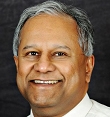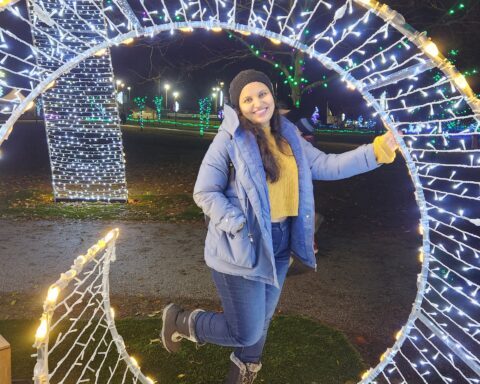If a beer company can harness the power of Canada’s diverse languages to open a fridge full of its wares as a marketing stunt, why not use that same force for civic engagement?
In time for this year’s Canada Day and the upcoming federal elections, the Canadian Arab Institute (CAI) has released an Arabic version of “O Canada” to open the hearts and minds of its cultural community.
Part of the CAI’s Your Voice campaign, “Ya Canada” is performed by soprano Miriam Khalil, and hits all the right notes, including the replacement of the contentious, “in all thy sons command” phrase with the gender-inclusive “in all of us command.”
This unofficial translation of the national anthem is “one of the tricks up our sleeve” to roll out the non-partisan voter engagement campaign, said Raja Khouri, president of the CAI during a recent panel discussion titled “From Marginalization to Integration” it hosted in Mississauga, Ontario.
The panelists included Ratna Omidvar, Executive Director of the Global Diversity Exchange at Ryerson University; Cathy Winter, Manager of DiverseCity onBoard; Crystal Greer, Director of Legislative Services & City Clerk with the City of Mississauga and Mohamad Fakih, the CEO of Paramount Fine Foods.
Bemoaning that voting was becoming more transactional in nature and not part of nation building, Omidvar emphasized the need to shift away from this trend. “Democracy belongs to all of us only when we actually start participating.”
[Mohamad]Fakih shared his experiences in civic engagement at the local level. Fakih stressed that, “Change is a belief that you can make a difference even if it takes time and hard work,” and it starts with voting to ensure the right to have a say isn’t lost.
Omidvar said there are all kinds of opportunities, including small daily acts as well as sitting on the boards of various public and non-profit institutions that lead to participation. “It is all about taking ownership and paying it forward.”
She said it is not an anomaly for people to have split national loyalties in an increasingly globalized world where multiple identities are a fact of life. “As long as we wear our various hats properly, it is the values we uphold that matter.”
‘Don’t have to Keep Heads Low’
Picking up on the importance of being involved in the community, Winter highlighted the work of DiverseCity onBoard. The program enables visible minorities to find a place on non-profit and charitable boards. Winter said it is imperative that the face of leadership reflects the new Canada and all communities need to stretch their social capital.
Greer showcased the City of Mississauga’s efforts in engaging citizens and making sure city council utilizes its skills and knowledge while developing policy. Greer said this is mostly done by including citizen advisers on the different committees of the municipal council and making sure their input and feedback is heard.
“[W]e must all become members of one political party or the other. We must infiltrate the system by not just sitting aside – when we move, we make change.” – Ratna Omidvar
With the self-deprecating claim that, “I am a shawarma man, not a politician,” Fakih shared his experiences in civic engagement at the local level. Fakih stressed that, “Change is a belief that you can make a difference even if it takes time and hard work,” and it starts with voting to ensure the right to have a say isn’t lost.
Apart from merely voting, Omidvar wanted the level of involvement in the political process to be a notch higher. She suggested that, “We must all become members of one political party or the other. We must infiltrate the system by not just sitting aside – when we move, we make change.”
All the panellists were of the opinion that new citizens coming from repressive societies must be made aware that it is possible to make change happen here in Canada and they have nothing to fear. “You need to unlearn repressions and know that you don’t have to keep heads low to stay out of trouble,” was the collective message from panellists to new Canadians to elevate their involvement in nation building.
Ranjit is a Toronto-based writer with interest in Canadian civic affairs, immigration, the environment and motoring. Maytree and Al Jazzera English alumnus.





